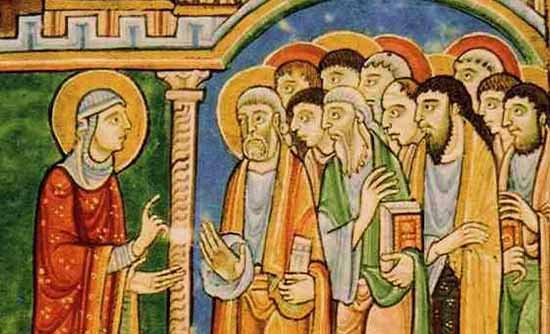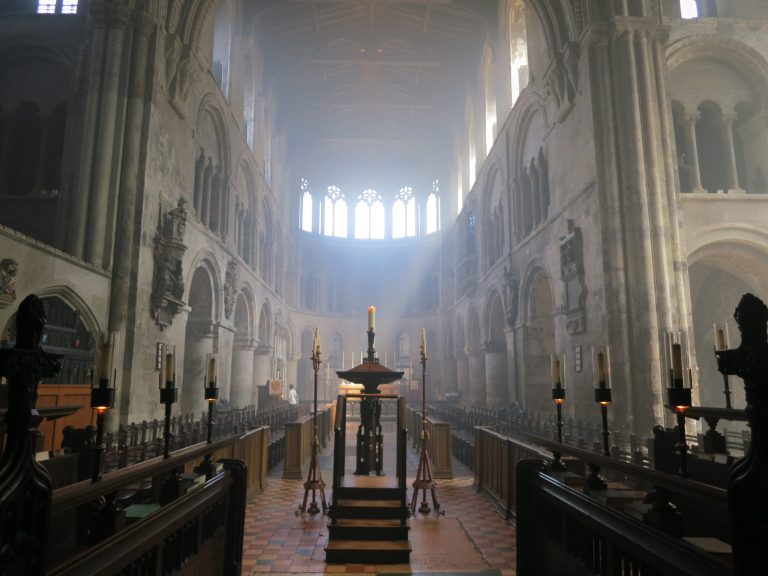Because Jesus Choosing Male Disciples Doesn’t Mean What We Think….
In fifteenth-century England, a (probably Franciscan) friar lived on the east coast near the cathedral city of Ely. Like many other medieval sermon authors, he included in his Lenten series a narrative from Matthew 15: the story of the Woman of Canaan. I have talked about this story before, and I am sure many of you are familiar with it. But, for those who are not, here it is:
“Leaving that place, Jesus withdrew to the region of Tyre and Sidon. A Canaanite woman from that vicinity came to him, crying out, “Lord, Son of David, have mercy on me! My daughter is demon-possessed and suffering terribly.” Jesus did not answer a word. So his disciples came to him and urged him, “Send her away, for she keeps crying out after us.” He answered, “I was sent only to the lost sheep of Israel.” The woman came and knelt before him. “Lord, help me!” she said. He replied, “It is not right to take the children’s bread and toss it to the dogs.” “Yes it is, Lord,” she said. “Even the dogs eat the crumbs that fall from their master’s table.” Then Jesus said to her, “Woman, you have great faith! Your request is granted.” And her daughter was healed at that moment.” Matthew 15:21-28, NIV
Now, as I have said before, I am neither a biblical scholar nor an expert in biblical languages. What I am is a medieval historian who has spent almost twenty years studying sermons. I am also a Christian who has been listening to sermons preached in evangelical churches (mostly Baptist and Evangelical Free) from the time I was old enough to sit through a service.
What medieval sermon authors emphasize about the woman of Canaan is fascinating to me. They don’t focus on her as a foreigner, they don’t focus on Jesus calling her a bad name, they don’t focus on her as a mother, they don’t even focus on her as a woman speaking in public to a group of learned religious men.
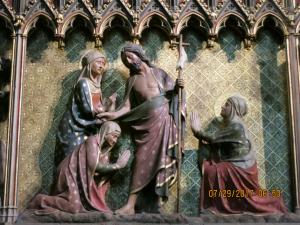
Instead, they focus on her faith. Especially her faith as contrasted with that of the male apostles.
Listen to what our fifteenth-century Franciscan friar says about her: “She prayed with great perseverance for she rested not till Christ granted her what she asked. Also she prayed with great humility and great peace for she asked not for riches nor praise nor vengeance for her enemies nor help for herself but only mercy that her daughter might be delivered of the demon.” The sermon text then states–and this is the really striking part–that unlike St. Paul, who cried to God for his “thorn of the flesh” to be removed but God “would not hear his prayer,” God “granted this woman her asking.”
God heard and answered affirmatively the prayers of this woman while denying the prayers of the Apostle Paul.
Let that sink in for a minute.
I think this medieval Catholic friar understood something that we, as modern protestant evangelicals, miss. The world around Jesus put men first. Men were the public figures, men were the public teachers, men were the public leaders. As Marg Mowczko reminds us, in order for Jesus to be recognized as a Jewish rabbi, he needed male followers. “He needed to have at least ten male disciples. With twelve Jewish male disciples, Jesus’ status as a rabbi was never questioned, even by his critics.”
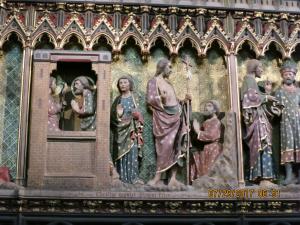
Isn’t it ironic then, that, in Jesus’ world, it is the men who are always getting it wrong?
They are the ones who lack faith, they are the ones who sink in the storm, they are the ones who fight about power, they are the ones who try to chase the woman of Canaan away, they are the ones who deny Jesus at the crucifixion. As Daniel Kirk, a New Testament professor at Fuller Seminary, writes, “The twelve were committed to Jesus, and happy with him–but only as one who came with power. They lacked faith to participate in his way of death. They did not have eyes to see that the ministry of Jesus turned the economy of the world on its head.”
While the male disciples argue about power and sink in the stormy waters, it is the woman of Canaan whose great faith heals her daughter, it is the woman in Luke whose great faith heals her bloody flow, it is the woman at the well who understands who Jesus is and goes to tell her friends, it is the women who witness the resurrection and bring the good news to the disciples. As our medieval friar also wrote, “The daughter of Eve was the beginning of damnation for mankind; but the faith of women in the new law was beginning of salvation of mankind; For the faith of our lady saint Mary was the beginning of our all our salvation…Mary Magdalen was the first messenger of life; the first messenger of Christ’s resurrection to the apostles who had fallen from faith during his passion…As St. Paul says, the man of false belief shall be saved by a woman of right belief.”
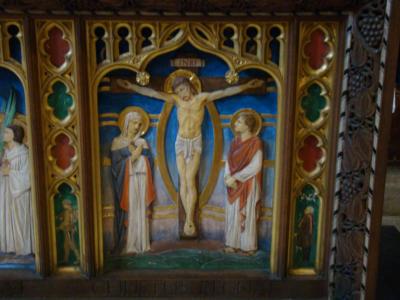
While the world around Jesus put men first, Jesus showed his male disciples a different world. A world in which a woman may publicly speak with men, a world in which a woman has greater faith than men, a world in which women are recognized as leaders like men. A world in which “the man of false belief shall be saved by a woman of right belief.”
Isn’t it interesting that a medieval friar seemed to understand this world upside down (especially considering the masculine hierarchy of the medieval church)? Instead of the male disciples being an example of what to do, they are an example of what NOT to do.
As Jesus rebukes the disciples in Mark 10 (and I am quoting from Daniel Kirk’s article): “Jesus called them over and said, ‘You know that the ones who are considered the rulers by the Gentiles show off their authority over them and their high-ranking officials order them around. But that’s not the way it will be with you. Whoever wants to be great among you will be your servant. Whoever wants to be first among you will be the slave of all, for the Human One didn’t come to be served but rather to serve and to give his life to liberate many people’”.
Sadly, like the twelve disciples, modern evangelicals don’t seem to understand what Jesus was saying either. Instead of focusing on what Jesus was teaching us about women, about immigrants, about the poor, we have focused instead on what he was trying NOT to teach us: male power hierarchies. Owen Strachan demonstrates this all to well. As he wrote so emphatically, “Elders preach, teach, and shepherd the flock of God; only men are called to the office of elder, and only men who excel as heads of their wives and children are to be considered as possible candidates for leadership.” For Strachan, the model of the male disciples is what we should emulate. Jesus chose men, so we should choose men too.
Daniel Kirk was writing several years before Owen Strachan, but I think he has a good answer for him. “The irony of appealing to the boys as insiders is that in so doing we show ourselves to be adopting the boys’ understanding of power, privilege, and leadership in the kingdom. And this view is roundly rebuked by Jesus in words dissuasion and the work of the cross.”
I find it so ironic that we spend so much of our time fighting to make Christianity look like the world when Jesus fought so hard to make a different world. Yes, Jesus chose twelve men, but then he spent the rest of his ministry subverting that patriarchal structure. Instead of the male Jewish leaders getting it right, it was the centurion and the thief on the cross and the lepers and the women who understood his teachings. While the prayers of the Apostle Paul went unanswered, Jesus commended the woman of Canaan for her great faith.
Jesus choosing twelve men wasn’t giving us a model to emulate. It was teaching us that power and hierarchies don’t matter in the world of Jesus. I think a medieval priest may have understood this. I really wish we would too……
The medieval manuscript is Longleat House MS 4 (which I have quoted from before). Some of the research I presented here is forthcoming in an article next Fall.
